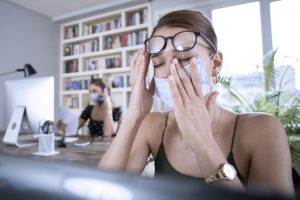
If not, you’re certainly not alone. Eye care doesn’t factor into most people’s daily lives. But neglecting your eyes may contribute to vision problems, discomfort, and increased risk for certain age-related eye diseases.
Here are a few ways to increase eye hygiene and vision care.
Avoid Rubbing: Itchy eyes can hit hard, particularly during allergy season, and most people’s first reaction is to rub. It feels good and offers temporary relief, for sure, but it ultimately ends up boosting swelling and worsening the itch.
If you wear contact lenses, it increases the risk that they will either become dislodged or shatter in your eye. Lastly, rubbing your eyes increases the risk of eye infections.
Keep Hands Clean: Washing your hands can help protect your eyes by limiting the likelihood of transferring infectious germs and bacteria to the eye. Conjunctivitis (pink eye) is basically caused by germs entering the eye from unclean hands.
Be Aware of UV Rays: UV rays pose a threat to eye health all year long, not just during the summer months. Wearing UV-blocking lenses year-round can block out exposure to harmful rays that can lead to corneal sunburns and macular degeneration.
Stay Hydrated: Too little fluid in the body can reduce tear production and contribute to dry eyes, which can increase the temptation to rub and make it more difficult for foreign substances to be removed.
Eat A Healthful Diet: Nutrient-rich fruits and vegetables, particularly those with vitamins A and C, can promote eye health. Omega-3 fatty acids found in fatty fish are also great for your eyes.
Maintain A Safe Distance From Screens: Keep computer screens about an arm’s length away, roughly 20 degrees below eye level. Have lights on in the room to reduce the screen light intensity.
Observe the 20-20-20 Rule: Look away from digital device screens every 20 minutes for 20 seconds at something 20 feet away. Remember to blink!